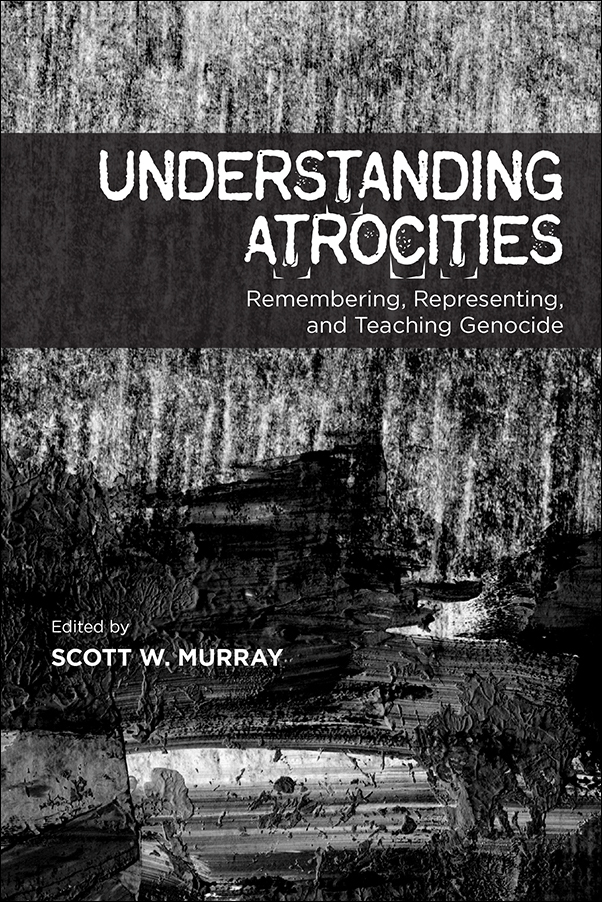
Understanding Atrocities: Remembering, Representing, and Teaching Genocide
Edited by Scott W. Murray
$34.95 CAD / $34.95 USD
296 pages, 3 illustrations
6 x 9 inches
Paperback: 978-1-55238-885-3
Epub: 978-1-55238-888-4
Library PDF: 978-1-55238-887-7
February 2017
How do we understand and represent atrocities? What are the challenges we face in teaching and learning about extreme events? This is a multi-focused, multidisciplinary exploration of key questions in contemporary genocide studies.
Understanding Atrocities is a wide-ranging collection of essays bridging scholarly and community-based efforts to understand and respond to the global, transhistorical problem of genocide. The essays in this volume investigate how evolving, contemporary views on mass atrocity frame and complicate the possibilities for the understanding and prevention of genocide.
The contributors ask, among other things, what are the limits of the law, of history, of literature, and of education in understanding and representing genocidal violence? What are the challenges we face in teaching and learning about extreme events such as these, and how does the language we use contribute to or impair what can be taught and learned about genocide? Who gets to decide if it’s genocide and who its victims are? And how does the demonization of perpetrators of atrocity prevent us from confronting the complicity of others, or of ourselves?
Through a multi-focused and multidisciplinary investigation of these questions, Understanding Atrocities demonstrates the vibrancy and breadth of the contemporary state of genocide studies.
With Contributions By: Amarnath Amarasingam, Andrew R. Basso, Kristin Burnett, Lori Chambers, Laura Beth Cohen, Travis Hay, Steven Leonard Jacobs, Lorraine Markotic, Sarah Minslow, Donia Mounsef, Adam Muller, Scott W. Murray, Christopher Powell, and Raffi Sarkissian
Scott W. Murray is Associate Professor of History at Mount Royal University. He was a Hess Faculty Fellow in the Center for Advanced Holocaust Studies at the United States Holocaust Memorial Museum in 2015, and a Holocaust Education Foundation Fellow at Northwestern University in 2013. He was also the recipient of the Calgary Jewish Community Award for Holocaust and Human Rights in 2011 and 2013.
List of Figured
Acknowledgments
Abbreviation
Introduction
Scott Murray
Chapter 1. Atrocity and Proto-Genocide in Sri Lanka
Christopher Powell and Amaranth Amarasingam
Chapter 2. Finding Global Justice Locally at Sites of Atrocity: The Case for the Sreberinca-Potocari Memorial Centre and Cemetery
Laura Beth Cohen
3. Troubling History, Troubling Law: The Question of Indigenous Genocide in Canada
Chapter Adam Muller
Chapter 4. The Benefits and Challenge of Genocide Education: A Case Study of the Armenian Genocide
Raffi Sarkissian
Chapter 5. "We Charge Genocide": A Historical Petition All but Forgotten and Unknown
Steven Leonard Jacobs
Chapter 6. "A Tragedy to be Sure": Heteropatriarchy Historical Amnesia, and Houses Crises in Northern Ontario
Travis Hay, Kristen Burnett, and Lori Chambers
Chapter 7. Remembering Them All: Including and Excluding Atrocity Crime Victims
Andrew R. Basso
Chapter 8. Helping Children Understand Atrocities: Developing and Implementing and Undergraduate Course Title War and Genocide in Children’s Literature
Sarah Minslow
Chapter 9. Thanking about Nazi Atrocities Without Thinking About Nazi Atrocities: Limited Thinking as a Legacy in Schlink’s The Reader
Lorraine Markotic
Chapter 10. Atrocity, Banality and Jouissance in Performance
Donia Mounself
Contributors
Index
[This book] provides a window into the urgent, complex, and interdisciplinary dialogues underway in Genocide Studies.
—Jobb Arnold, Peace Research
Chapter 3. Troubling History, Troubling Law: The Question of Indigenous Genocide in Canada
Chapter 4. The Benefits and Challenges of Genocide Education: A Case Study of the Armenian Genocide
Chapter 5. “We Charge Genocide”: A Historical Petition All but Forgotten and Unknown
Chapter 7. Remembering Them All: Including and Excluding Atrocity Crime Victims
Chapter 10. Atrocity, Banality and Jouissance in Performance